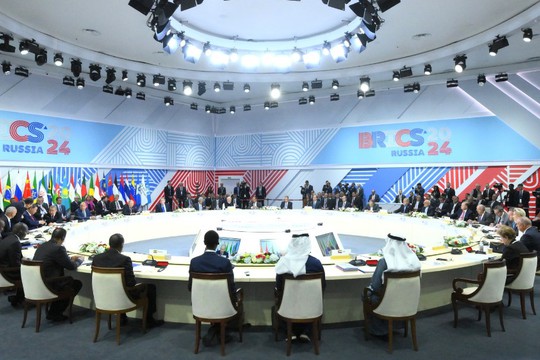The BRICS summit in Kazan.
Photo: Kremlin.ru
The BRICS summit in Kazan chaired by Russia has drawn great international attention because it conveys many messages in the current geopolitical context and that of the future, writes Kanwal Sibal, former Foreign Secretary and Ambassador to Turkey, Egypt, France and Russia, and Deputy Chief of Mission in Washington.
The West has tried to isolate Russia internationally, defeat it militarily, and, through an array of draconian sanctions, cause its economic collapse. None of these objectives have been met.
Russia's ties with China have deepened strategically. India has preserved its strategic ties with Moscow despite western pressure. Russia's ties with several African countries also have a new momentum. Moscow is strongly present in the West Asia region and has a close relationship with key Arab countries. Its partnership with some ASEAN countries is gathering steam too.
The expansion of BRICS in 2023, with Egypt, UAE, Iran, Ethiopia and Saudi Arabia, had already signalled how major countries in the Global South viewed Russia very differently from how the West saw it. The Global South sees Russia as a friendly country, not an adversary. That almost 40 countries have shown interest in joining BRICS, a forum in which Moscow plays a key role, signifies that for them, Russia is an attractive partner.
The countries of the Global South seek a reformed international system that would reflect the shifts in power equations away from the West, both economic and political, that have occurred over the years. They want more attention to be paid to their concerns and priorities.
The hypocrisy and double standards of the West's “values-based” policies, its military interventions and the use of various means to bring about regime changes, the use of sanctions as a policy tool, the weaponisation of the dollar and the global financial system by the US, have increasingly pushed non-Western countries to hedge themselves against western pressures by joining forums such as BRICS. If Russia earlier looked westwards, the West has turned its back on Russia, and now Russia is much more focused on its Eurasian identity and is looking eastwards.
Non-western countries cannot opt out of the existing international system or create one of their own. What they hope to do is to change the balance of power within the existing system and reform it to ensure more equality and equity in its functioning. The Global South countries, which also have close relations with the West, are being attracted to join BRICS or associate with it in order to increase their political, economic and security options.
With 24 world leaders having attended the Kazan summit, including those of five founding members and the four new permanent members, the West's already failing efforts to isolate President Putin and Russia have been strongly rebuffed.
With so much interest in BRICS in the Global South, the question of expanding its membership and the criteria for that have posed difficulties. BRICS is a consensus-based forum. With the expansion, building a consensus on issues would become more difficult, and that would affect the working and credibility of the forum.
The decision, therefore, has been not to broaden the BRICS membership for the moment but to enlarge its base by accepting new countries as partners. Developing a consensus within BRICS on which countries should be admitted as partners was presumably not an easy exercise, as all the BRICS members, old and new, had effective veto rights. It had to be ensured that no member country was particularly advantaged by the choice of partners and that the final list reflected a balance between the preferences of the forum's members.
Thirteen new BRICS partners have been accepted at Kazan—Algeria, Belarus, Bolivia, Cuba, Indonesia, Kazakhstan, Malaysia, Nigeria, Thailand, Turkey, Uganda, Uzbekistan, and Vietnam. That four members of the ASEAN are also among these is significant.
Russia's obvious preference for Turkey has also been accommodated given the latter's geopolitical importance for Russia, even though giving a partner status to a NATO country might not seem to fit into any normal criteria for deciding BRICS partnerships. Should NATO get a foothold in BRICS? From the Russian point of view, this would be a welcome political development in NATO's eastern flank. The US, which sees BRICS as an organisation created to rival the West in the global system, would be obviously perturbed by Turkey's decision.
The importance of BRICS' expanded partnerships across Asia, Africa and Latin America should not be underestimated. It shows dissatisfaction with the current international system. Non-western countries want an end to the West's hegemony. They suffer from the West's self-centred and arbitrary policies. Strengthened multilateralism reflected in multipolarity is seen as the key to change.
All said and done, BRICS expansion, with all its challenges, is a vehicle for a much-needed re-balancing within the global system, which India also seeks.
read more in our Telegram-channel https://t.me/The_International_Affairs

 11:39 05.11.2024 •
11:39 05.11.2024 •























